Press
Check Us Out!
Freedom to Thrive is available to respond to press inquiries regarding prison abolition and reform, prison industry divestment, intersectional movement-building, and other topics related to criminal and immigration systems.
For press inquiries, please contact info@freedomtothrive.org
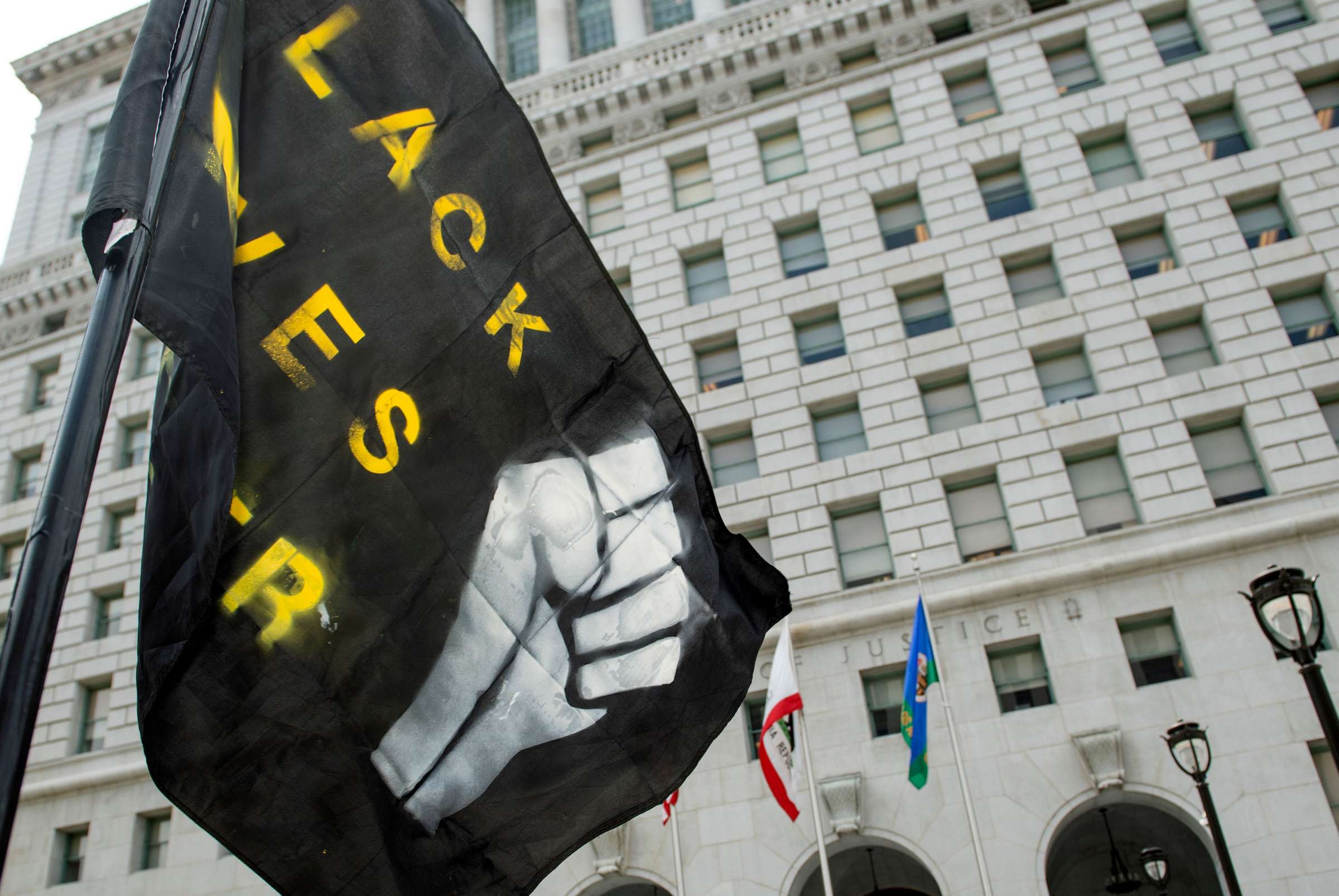
Prosecutors Have No Place in Truth, Justice and Reconciliation Commissions
August 22, 2020
As abolitionist organizers on the ground in Boston, Philadelphia and San Francisco, we are appalled and angered by the announcement by three district attorneys (DAs) — in partnership with Shaun King’s “Grassroots Law Project” — to pilot “Truth, Justice and Reconciliation Commissions” (TJRC) in our cities.
Check out full op-ed at Truthout!

Pandemic Leads to Increased House Arrests, Electronic Monitoring
July 29, 2020
House arrest might seem like a good alternative to incarceration, especially during a pandemic, but it comes with its own costs. Ankle shackles are outfitted for electronic monitoring, which concerns advocates for people who are detained.
Check out full article at PNS

Defunding the Portland police: The local abolition movement, explained
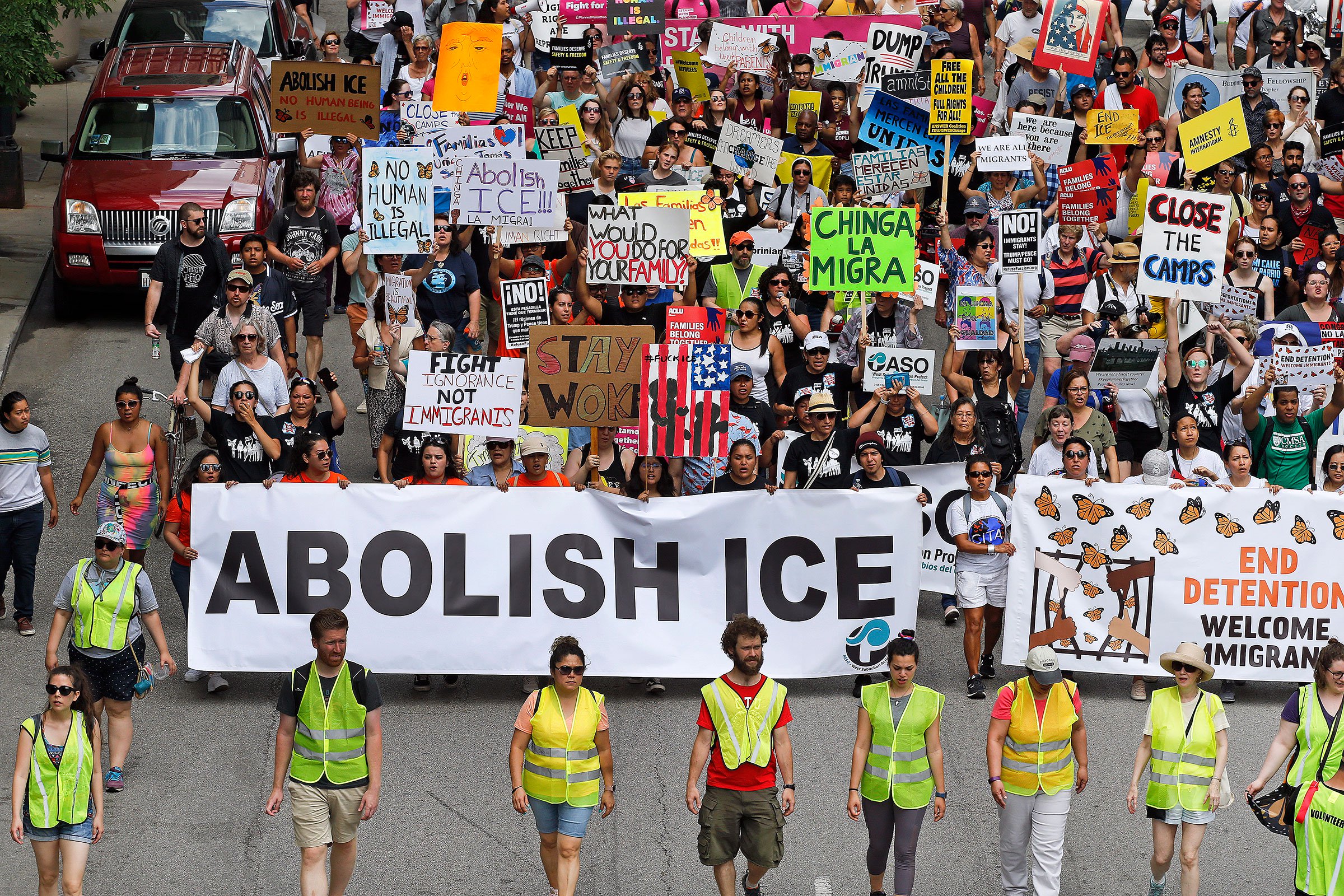
Big Banks Are Divesting From Private Prisons, Thanks to Anti-ICE Activism
July 23, 2019
“On the one end, seeing immigrant detention as an extension of mass incarceration is super important … it’s not just a Latino issue, but a Black issue, and also an issue impacting other communities as well,” said Daniel Carrillo, executive director of Freedom to Thrive, a racial justice group with a longstanding prison divestment campaign. “It’s part of a bigger system that is divesting resources from communities and pushing those resources into prisons and detention, so we should be thinking about how we should reallocate and push for reinvestment and demand that from private and public actors.”
Check out full article at Truthout!
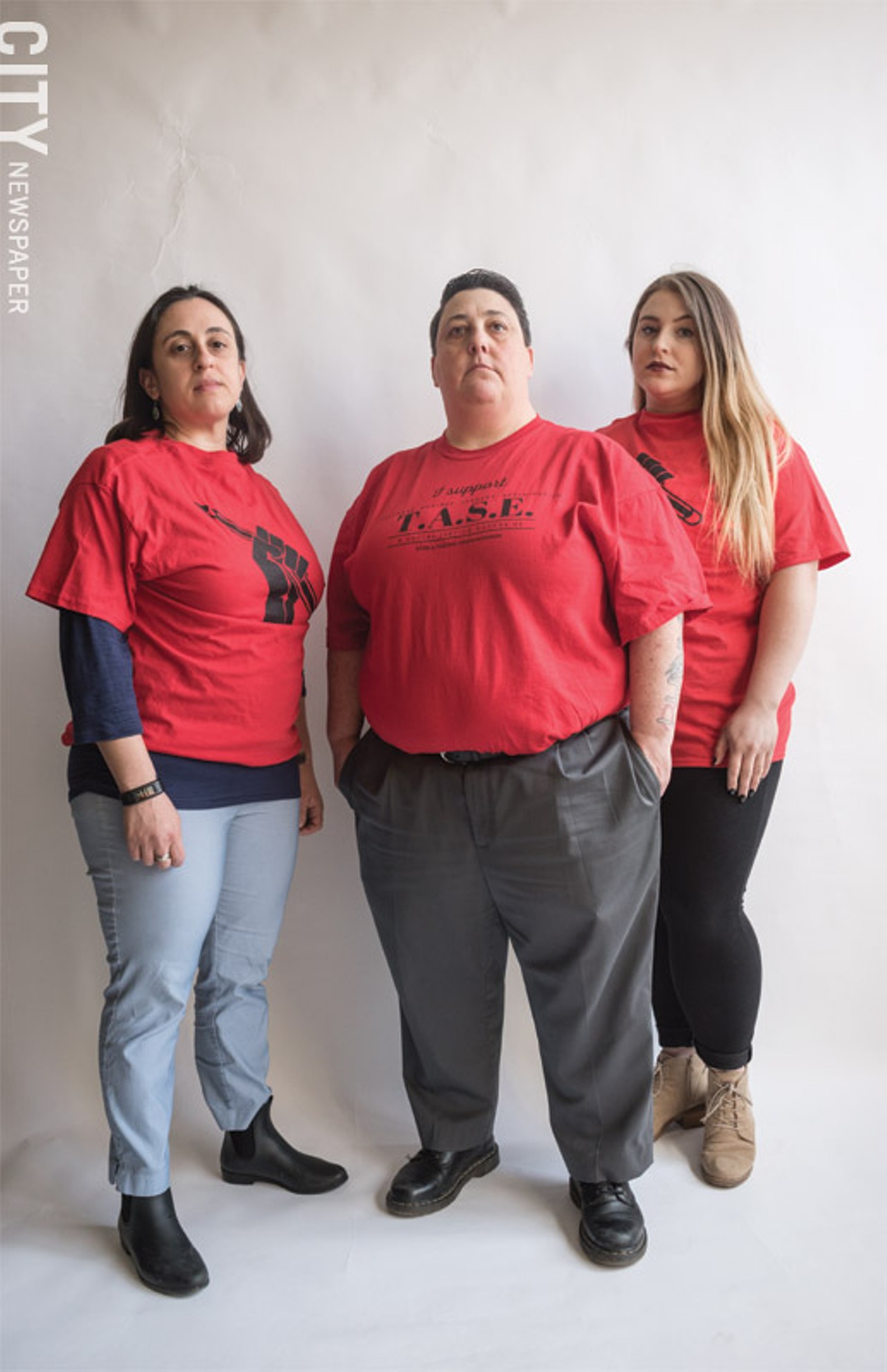
Teachers Call for Prison Divestment
April 10, 2019
Many people working in urban school districts are aware of the existence of a so-called cradle-to-prison pipeline. The 2008 Children’s Defense Fund’s campaign offered a clear-eyed look at the link between childhood poverty and incarceration, and the particularly negative effect it has on black and Latino youth.
But many teachers may not know that some of their retirement benefits stem from investments in prisons because of a pension-to-prison connection, says Michelle Sapere, a teacher with the Rochester City School District.
Check out full article at City Newspaper
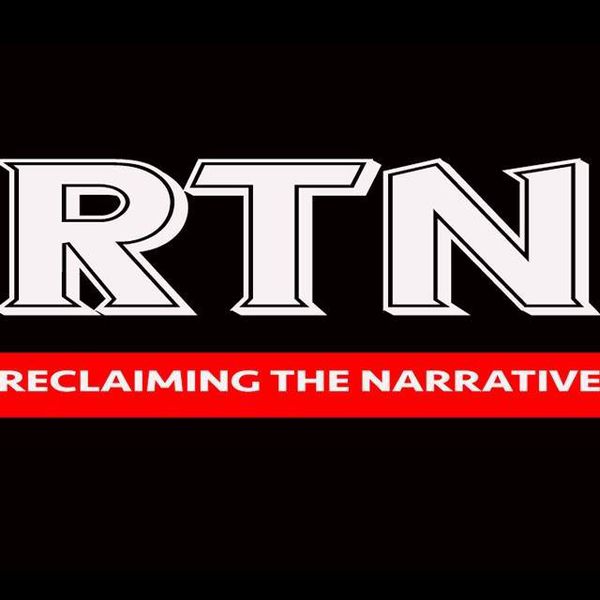
Reclaiming the Narrative Radio Show
March 22, 2019
Listen to a radio interview of Basma Eid from Freedom to Thrive share about organizing developments led by New York state teachers to divest their pension from the prison industry. Interview starts at 15 minutes into the show.
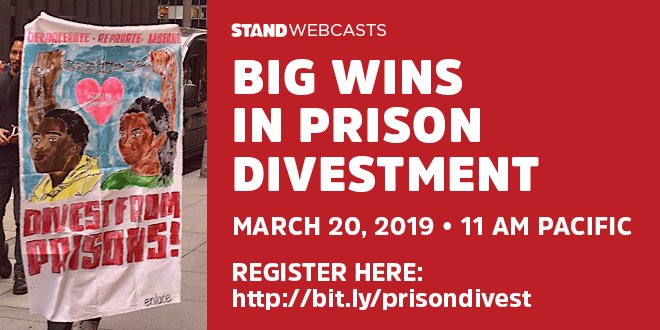
STAND: Big Wins in Prison Divestment 2019 Webcast
April 1, 2019
Check out our Executive Director Daniel Carrillo on Moving Investors To Say No To Prisons: Big Wins in Prison Divestment 2019 Webcast.
Check out full webcast here!

BREAKING: Wells Fargo Breaks Ties
March 13, 2019
Family, shout out to you & our collective power!
Wells Fargo just stated it will stop financing the prison industry!
For the past decade, Wells Fargo has been a major funder of corporations like GEO Group and CoreCivic, lending out million dollars of credit they used to build new prisons and detention centers.
Freedom to Thrive members and partners have been calling for an end to Wells Fargo’s support for the punishment industry for a decade. Our Prison Divestment Campaign began in 2010 as the state increased the criminalization of immigrants through threats and raids targeting our communities. We knew we had to tackle the root cause of the criminalization of Black and brown people. Freedom to Thrive (fka Enlace) worked with local organizations across the country to create divestment strategies targeting banks and corporations that fund the industries that keep our families locked up.
Read more at our Prison Divest page
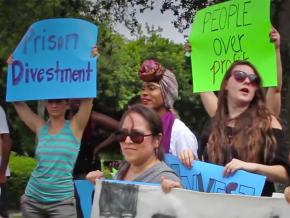
We Won't Let Our Pensions Build Prison Cells
March 13, 2019
About a month ago, I received a call from Basma Eid of Freedom to Thrive in New York City. She had gotten my contact information from a mutual friend and comrade and was looking for teachers in upstate New York to discuss an important issue.
This phone call happened to fall during the exact time I was trying to start a social justice caucus of rank-and-file teachers after growing increasingly impatient and frustrated by the lack of union leadership’s tangible support of striking educators across the country.

Immigration Activists See Private Prisons Divestment as a Way to Abolish ICE
March 11, 2019
Immigration activists see their campaign to get banks to divest from private prison companies as a backdoor way to abolish U.S. Immigration and Customs Enforcement (ICE) by taking away its capacity to detain illegals caught crossing the southern border.
“It goes even beyond ICE,” Daniel Carrillo, executive director of Freedom to Thrive, told The Daily Caller News Foundation. “Immigration should be a right.”

Breaking: JPMorgan Chase Cuts Ties with the Prison Industry!
March 6, 2019
Since 2010, Freedom To Thrive has been targeting Wall Street banks, like JPMorgan Chase, for their role in bankrolling an industry that profits off pain and keeps our families in cages. JPMorgan Chase is a member of the “million shares club,” owning over one million shares in CoreCivic and Geo Group, two companies that together are responsible for incarcerating over 60% of families held in immigration detention and more than 120,000 people confined in the prison system.
Read more at our Prison Divest page

JPMorgan Backs Away from Private Prison Finance
March 5, 2019
JPMorgan Chase & Co has decided to stop financing private operators of prisons and detention centers, which have become targets of protests over Trump administration immigration policies. “We will no longer bank the private prison industry,” a company spokesman told Reuters. The decision is a result of the bank’s ongoing evaluations of the costs and benefits of serving different industries, he said.
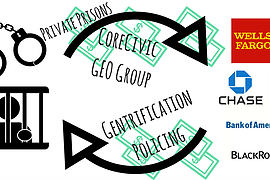
Investment Banks Doubled Down on Immigration Detention Amidst Family Separation
August 27, 2018 Image Credit: Enlace
Several investment banks, including J.P. Morgan Chase, bet big on the profitability of immigration detention earlier this year when they decided to extend a $1 billion credit line to private prison company CoreCivic.

At #SafetyIs rally, dozens of people in New York City imagine a community free of police violence
August 2, 2017
BRONX, NEW YORK — People across the country participated in Night Out for Safety and Liberation events in 30 cities on Tuesday to demonstrate how they imagine a community without police violence. In the Bronx borough of New York City, NYC Freedom Cities and the New York Worker Center Federation hosted its own NOSL action.
Night Out for Safety and Liberation events began in 2013 as a response to the fatal shooting of Trayvon Martin and the violence inflicted on black and brown communities by police. The event’s guiding mission is to promote the idea that police-focused solutions cause harm to people of color and don’t lead to better or safer communities. It also serves as a response to the annual National Night Out held by police departments across the country that aim to foster better relations between police and communities.
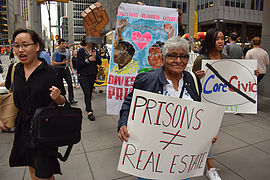
Protests Disrupt Real Estate Conference over Private Prison Companies’ Attendance
June 6, 2018
In New York City, an annual real estate conference faced protest Tuesday over the attendance of private prison companies. GEO Group and CoreCivic converted in 2013 to real estate investment trusts, or REITs, to avoid paying corporate taxes. The Republican tax plan also offers a 25 percent tax cut on investments in prisons.
Check out what Enlace’s Executive Director, Daniel Carrillo, had to say on

NYC Pension Funds Withdraw Investments From Private Prisons
New York City’s pension funds have decided to sell its investments in private prison companies, citing a record of alleged human rights abuses and citing the risk of the industry attracting “long-term reputational and financial harm.”
“Morally, the industry wants to turn back the clock on years of progress on criminal justice, and we can’t sit idly by and watch that happen,” said Stringer, who serves as the funds’ custodian and investment adviser. “Divesting is simply the right thing to do, financially and morally.”
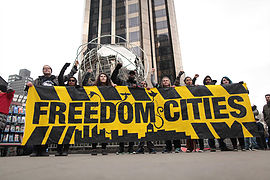
Protesters take to New York City during Donald Trump’s inauguration
Basma Eid helped organize the Freedom Cities protest outside Trump hotel as a part of Enlace, the New York Worker Center Federation. She protested for the rights of workers, from street vendors to construction workers. Some protesters’ signs made their intents clear, especially at Freedom Cities. Their posters featured their definition of safety, whether that was free healthcare, the right to organize or divesting from police and prisons.

President Trump Is Just What the Private Prison Industry Ordered
“One thing is certain under a Trump Presidency: We will no longer even have the veneer of relying on the federal government to protect immigrant and refugee communities,” says Amanda Aguilar Shank, deputy director of immigration and anti-incarceration advocacy group Enlace, which has been pressuring cities like Portland to divest from the private prison industry and the banks that finance it. “To protect ourselves,” she tells In These Times, “we have to use the power we have at the local level, and the power of our dollars.”
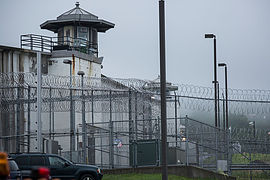
What the DOJ’s new private prison policy could mean for the prison divestment movement
For years, activists have urged companies, pensions, and universities to divest from private prisons—with only limited success. But yesterday, when stocks of the two biggest private prison companies in the country fell more than 35%, might signal a new frontier in the divestment movement.
What Do Private Prisons Have to Do With the Upcoming Election?
What do private prisons have to do with the upcoming elections?
Let’s start with several hundred thousand dollars in campaign contributions.
Banking on Detention: Demonstrators Call on Wells Fargo to Divest from Private Prisons
National People’s Action and the National Prison Divestment Campaign exposed that the bank was heavily invested in two major such companies with nearly $100 million of holdings in GEO Group and nearly $3 million in the Corrections Corporation of America (CCA). The groups launched a public pressure campaign, branding the bank “Jails Fargo” and holding demonstrations outside its branches.
Continue reading on In These Times.
Bill Gates Foundation’s Investments Questioned In Street Protest
As activist investment tactics used by aggressive hedge fund managers comes into focus, social movements mimic their tactics — or perhaps vice versa. The investment portfolio of Bill Gates is being questioned by social activists, as a protest erupted outside their investment meeting that comes on the heels of a hunger strike.
Continue reading on ValueWalk.
The end of the for-profit prison era?
A nationwide campaign to stem investments in private corrections companies is gathering steam.

Private prison investors set for giant windfall from Trump tax bill
December 28, 2018
Prison firms that restructured as real estate investment trusts see substantial tax cut – more good news for those who benefit from increased incarceration.
“Since the tax benefit goes directly to investors, prison divestment work actually becomes more important as a way to fight back and stop the flow of capital,” Jamie Trinkle of Enlace said.
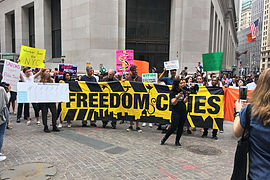
Fed Up With Big Banks That Fund Climate Crisis and Oppression, Community Coalition Demands Public Bank for New York
June 6, 2018 Photo Credit: Hyung Kyu Nam
The crowd also heard from a Brooklyn resident whose rent has doubled in recent years and who spoke about the exorbitant fees New Yorkers pay to big banks every year, a student who spoke out against predatory loan practices and Wall Street’s investment of billions of dollars in fossil fuels that accelerate and worsen the climate crisis, and a social justice activist who told the crowd of JPMorgan Chase’s support for private prisons.
“As long as the city continues to deposit its money in prison financiers like JPMorgan Chase, we will remain complicit in systems of oppression that profit off of incarcerating our communities,” said Basma Eid of the racial and economic justice group Enlace. “It’s time New York City puts its money where its mouth is, divests from Wall Street, and—through a public bank—invests in us.”
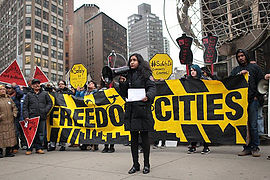
Reality Check: More Police Officers Don’t Equal Safer Neighborhoods
July 4, 2017 • YES! Magazine
On Inauguration Day, a coalition of New York City-based organizations held a mass demonstration outside the Trump Hotel, demanding resources for oppressed communities not only to survive, but also to thrive. The coalition wants sanctuary to include the provision of safety for citizens who live in danger daily.

Portland Votes to Divest from All Corporations
April 7, 2017 • Colorlines
Portland City Council passed an amendment Wednesday (April 5) with a unanimous vote to end new investments in corporate securities in stocks and private bonds, including the Dakota Access Pipeline, President Donald Trump’s proposed border wall, corporations complicit in prisons and the occupation of Palestine.
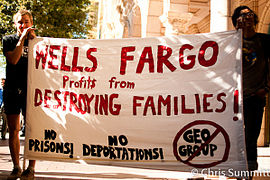
Meet the Six Big Banks Keeping Private Prisons in Business
“The banks are enabling these companies to profit off the criminal justice system,” said Davis. “If these companies didn’t have access to revolving credit, it would become much harder for them to finance their businesses.”

Is This the Beginning of the End for the Private Prison Industry?
Likely the most far-reaching opposition has come from the National Private Prison Divestment Campaign, launched in 2011… Focused on pressuring institutional investors to divest holdings in private prison shares, this campaign has involved more than 200 partner groups. The Campaign has won divestment victories at UC Berkeley, Wesleyan and Columbia as well as persuading investment firms like Pershing Square Capital Management and Allianz Asset Management to strip away shares in private prisons.
Senate Bill Would End Tax Breaks for Private Prison Companies
Senator Ron Wyden (D-Oregon) introduced legislation last week that would make it tougher for private prison companies to take advantage of federal rules that provide massive tax breaks for special real estate firms, a move that racial justice and prison divestment activists say is an important step toward confronting the corporations that control around 8 percent of the nation’s prisons and immigrant jails.

Deportation Inc: The Industry of Fear
Univision nationally premiered a hour long special investigation on the vast For-Profit Prison Industrial Complex that includes immigrant detention, electronic monitoring, and mental health. The segment covers that role of major investors like Wells Fargo and the revolving door between corporations and the government.
Watch the special with English subtitles.

Did the Private Prison Lobby Kill Immigration Reform?
ColorLines interview with Enlace’s Peter Cervantes-Gautschi on the role of the private prison lobby in defeating immigration reform in 2014.

How the For-Profit Corporate Prison Lobby Killed Immigration Reform
Peter Cervantes-Gautschi illustrates that in order to free undocumented immigrants from the threat of incarceration, the focus has to be on reducing the corporate prison industry’s influence on Congress.

Below the Surface of ICE: The Corporations Profiting From Immigrant Detention
September 17, 2018
Traditional immigration activists are now being joined by anti-war, feminist and climate action groups, and others. The broad coordination is possible because the U.S. immigration system bleeds into so many areas of progressive ire, from police brutality and labor abuse to the ongoing wave of privatization and financialization. “We really prioritize building intersectional coalitions,” says Daniel Carrillo, executive director of ENLACE.

Wall Street’s Ties to the Private Immigrant-Detention Network
July 24, 2018
As the demand for a comprehensive immigration overhaul grows, the prison divestment campaign seeks to demonstrate the economic leverage that ordinary consumers, workers, and universities can wield when they seek integrity and accountability in the way capital interacts with public institutions and communities.
In addition, Enlace and other grassroots organizations are pushing for community reinvestment along with divestment, including the establishment of a public bank in New York City to create a financial alternative to placing funds in financial firms linked to the prison system.

These Cities Might Just Save the Country
In Los Angeles, the City Council voted unanimously on June 27 to begin taking steps toward divesting $40 million from its holdings in Wells Fargo, which has come under fire in recent years for defrauding consumers, funding the Dakota Access pipeline, financing private prison corporations, and otherwise engaging in disreputable practices. Los Angeles joins numerous other cities, from Seattle, Washington, to Missoula, Montana, that have announced their intentions to cut ties with the banking behemoth.

University of California Next In Line To Dump Wells Fargo Contracts
The divest movement urging people to take their money out of banks that behave unethically has consistently been gaining traction, and no bank is getting more pressure these days than Wells Fargo. In the latest hit, it is set to lose $475 million in contracts with the University of California.
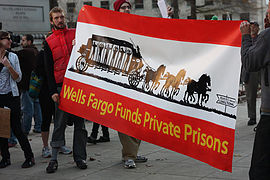
How Wall Street Firms Make Money From Donald Trump’s Prison Policy
A new report released today by In The Public Interest reveals that six major Wall Street firms work in tandem with the industry: financing its debts, servicing its bonds, and extending billions of dollars in credit to pay for its operating expenses and expansion into related markets, like selling ankle GPS systems to monitor immigrants.
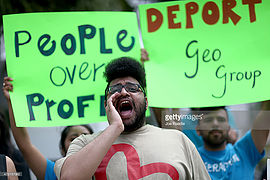
Ending private prisons at the federal level marks a major movement victory
When the U.S. Department of Justice announced its intentions to begin phasing out its use of private contractors in federal prisons, many welcomed this as a significant step in the dismantling of a profit-driven model of mass incarceration….While the announcement caused a major shake-up around the country — not least of which on Wall Street, where the stocks of the two largest private corrections companiesplummeted — activists recognize years of tedious work that preceded the DOJ decision.
Read more on Waging Nonviolence

OP-ED: Our Tax Money is Funding Private Prisons; Let's Fix This
Check out this recent op-ed from our Deputy Director, Amanda!
Soon, prison divestment will be up for a vote at the Portland City Council. We have the opportunity to set a national precedent that other cities will follow, to help financially isolate the prison industry and to stop its growth.
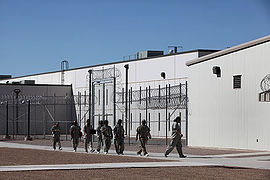
How Private Prison Companies Use Big Tax Breaks and Low Wages to Maximize Profit
The two largest private prison firms in the United States are exploiting a loophole in the tax code to secure millions of dollars in corporate tax breaks.
Corrections Corporation of America (CCA) and GEO Group avoided a combined $113 million in federal income taxes in 2015 alone, according to an analysis of federal financial filings by the racial and economic justice group Enlace.
With Immigration Reform Looming, Private Prisons Lobby to Keep Migrants Behind Bars
As the immigration reform debate heats up, an important argument has been surprisingly missing. By granting legal status to immigrants and ordering future flows, the government could save billions of dollars. A shift to focus border security on real crime, both local and cross-border, would increase public safety and render a huge dividend to cash-strapped public coffers.
Continue reading on Huffington Post.
Wall Street and the Criminalization of Immigrants
Named the 5th most censored story of 2010-2011 by Project Censored, Peter Cervantes-Gautschi’s article was published in Social Policy, Alternet, and CounterPunch.